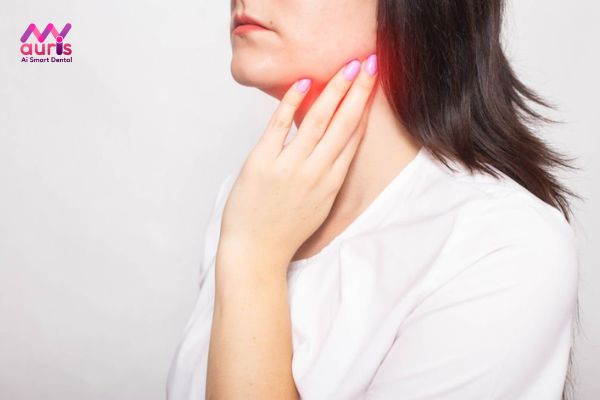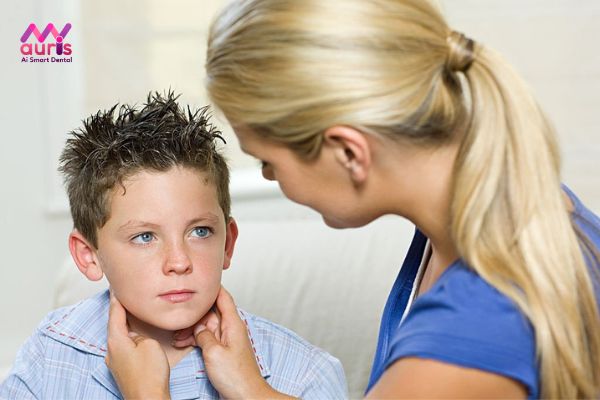Mumps is a disease caused by paramyxovirus, an acute infectious disease that is quite common in children. At present, there is still no specific medicine to treat mumps. Necessary notes are the need for timely diagnosis and treatment to avoid future complications.
What is mumps?
Mumps is a disease caused by a type of bacteria that belongs to caused by the Paramyxovirus group. It also has other names such as: Parotitis caused by mumps virus or epidemic parotitis. Mumps is an acute infectious disease, transmitted directly through the respiratory tract or causing epidemics in children and adolescents.
The common manifestation of the disease is inflammation of the parotid salivary gland without pus. Humans are the natural host of mumps. It has the ability to create long-lasting and durable immunity and the rare disease will recur a second time.

Causes of the disease
Currently, mumps is a disease that has appeared worldwide and the disease only shows signs of appearing and spreading in humans. The people most susceptible to mumps are young children and adolescents. There are also cases of the disease in adults, but the rate is lower.
The disease is caused by the mumps virus (Mumps virus), belonging to the Paramyxoviridae family, transmitted directly through food and respiratory tract, in addition it is also spread through droplets of saliva when the sick person speaks, sneezes or coughs. The case of mumps being transmitted through urine or feces has not yet been specifically determined, although the virus can exist in urine for about 2 to 3 weeks.
When a patient is infected, the virus will be able to multiply in the pharyngeal cavity and lymph nodes. It will likely increase in serum about 12 to 15 days after infection and will show signs of spreading to other organs. The disease is capable of spreading from 6 days before symptoms of parotid gland swelling appear until 2 weeks after more specific symptoms of the disease appear.
Symptoms of mumps
Symptoms of the disease will be shown through each stage, each stage will have different manifestations
- Incubation period: about 12-15 days, the incubation period has no signs of symptoms
- Initiation stage: The patient will experience body weakness, fatigue, headaches, and picky eating. There are signs of mild fever, sore throat and pain in the jaw angle, recognized through signs of pain in the mastoid process – temporomandibular joint – lower corner of the jaw bone. Next, there will be signs of gradually swelling and pain in the parotid gland, which will be more painful when chewing.
- Disease stage: The patient’s parotid gland will swell and become painful, then it will spread to the opposite side and other salivary glands. Accompanying signs at this stage, the patient will have a fever of 38, 39 degrees within the first 3 days. Also accompanied by loss of appetite, stomach pain, difficulty eating and communicating.
- Recovery phase: The parotid gland will show signs of pain relief and gradually become smaller, accompanying symptoms such as: Sore throat, difficulty chewing, difficulty swallowing, jaw bone pain will also gradually reduce and completely disappear after a period of one week.

Is mumps dangerous?
Any disease requires timely attention and examination to avoid dangerous complications later. The same goes for mumps, it is also a relatively dangerous disease and if not detected and treated promptly, it will easily cause unnecessary complications.
- Causes orchitis: More dangerous can be testicular atrophy, a dangerous complication leading to infertility affecting later life. But this phenomenon has a fairly low rate among sick people, only about 0.5%
- Ovarian inflammation for women: Typical signs are abdominal pain and menorrhagia. Notably, for pregnant women who get the disease within the first 3 months of pregnancy, it can easily lead to miscarriage or stillbirth in the womb.
- Myocarditis phenomenon
- Encephalitis, meningitis
- Pulmonary infarction: This complication is caused by thrombosis from the prostatic vein
- Acute pancreatitis: Usually mild, without symptoms
For adults, the incidence rate will not be as high as in children. But that should not be subjective because in adults it will progress seriously and leave dangerous complications. The above complications can occur at a low rate butalso cannot be subjective. It not only affects health but also affects fertility, especially can cause infertility and threaten the patient’s life.
Methods of preventing and treating mumps
Methods to prevent mumps
In all daily activities, the family needs to equip some of the following prevention measures:
- Need to gargle with salt water or use antibacterial solutions. Practice personal hygiene regularly
- Always keep the living space clean and airy, and periodically clean toys and items that children often use.
- If someone in the family is sick, children need to be kept away from the sick person
- When going to crowded places such as hospitals or amusement parks, parents should let children wear masks to prevent the high risk of disease transmission
- Implement vaccination for children: Mumps vaccine, or measles mumps rubella vaccine.
According to information, many medical agencies and the World Health Organization in developed countries recommend including mumps vaccine in the vaccination program. Mumps vaccine is often combined with measles and rubella vaccine in the same preparation (MMR) to simplify the vaccination process. Not only children, but also adults, especially women who intend to become pregnant, need mumps vaccination.

Methods to treat mumps
There is still no cure for mumps, the main current methods are still supportive treatment, patient care and prevention of complications.
- You should see a doctor for an accurate diagnosis when the patient has signs of pain in the parotid area. Because salivary gland inflammation is not only caused by the mumps virus but can also be caused by other bacteria.
- Need to drink plenty of water to rehydrate, can use Oresol
- Use fever-reducing and pain-relieving medications to alleviate symptoms
- Apply cool compresses to reduce pain and swelling of salivary glands
- Do not eat hard foods, spicy or acidic foods. Patients need to eat soft foods that are easy to chew, such as porridge and soup
- During the course of the illness, the patient needs time to rest and not come into contact with subjects at high risk of infection.
- Do not use antibiotics without a doctor’s prescription
- A male patient with signs of orchitis or a female patient with ovarian inflammation, the patient needs to go to the hospital for monitoring and treatment to avoid unnecessary complications.
Yen Nhi





